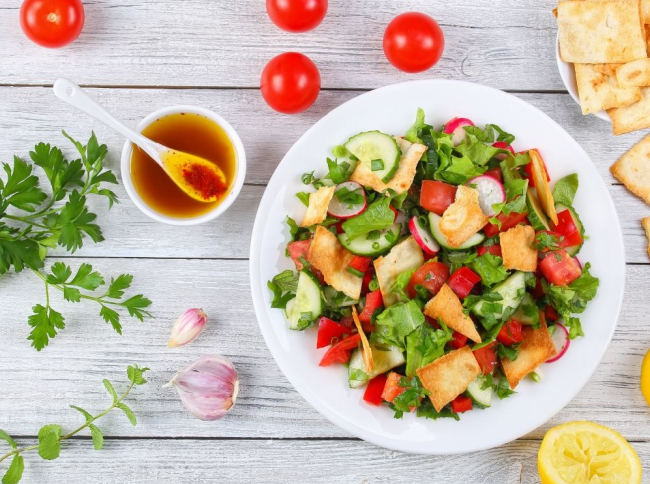
There are so many delicious and easy ways to eat better. Mother Nature helps, too, as the heat saps our desire for heavier fare. Here are some simple suggestions to get started.
Eat more fruit and veg
We’ve heard the 5&2 mantra – five serves of veg and two serves of fruit each day – for a long time now, but how we eat those seven serves is just as important as the volume. For starters, opt for what’s in season. It might be easy to get a lot of produce year round these days, but it’s always best to eat fruit and veg at the peak of their power, both for nutrition and flavour. It’s also generally cheaper, which helps the family budget. When you’re preparing food, mix up the colours to tempt the tastebuds and maximise the health benefits – the rainbow approach gives you a much wider intake of vitamins and minerals. It’s also much more appealing to the eye, too, such as this roast vegie and egg salad or the vibrant glazed BBQ chicken with colourful capsicum, oranges and spring onions. Don’t they just make you hungry?
Plan your meals
The more you plan, the less likely you are to reach for the phone and pick up unhealthy takeaways after a busy day. Stick to your shopping list so that you are buying healthy ingredients in the right amounts – this reduces wastage and ensures your produce is at its freshest. There are so many recipes to choose from the hardest part will be narrowing down your choices. Focus on seasonal, easy-to-prepare dishes and start with two or three days of meal planning. If you end up going out for lunch or dinner one day, the ingredients will keep. You can also do a bunch of cooking on the weekend and refrigerate for the next few days, or pop in the freezer to defrost on a day you know you will be busy.
Stock up on staples
Staples can help ward off that “there’s nothing to eat” feeling when you open the cupboard or the fridge. Dried ingredients such as red or green lentils can quickly be turned into soups or curries. Tins of chickpeas or cannellini beans are the basis for many an easy salad or vegetable dish, as are tinned vegies such as tomatoes and corn (just check there is no added salt), and wholegrain pasta, brown rice and other grains such as quinoa or freekah. Always stock onions and garlic, the start of so many meals, and keep a bottle of good quality olive oil, such as Jingilli EVOO, and vinegar handy, too – a splash of both can do wonders. In the fridge, stash free-range eggs (such as Albany Farm Fresh Eggs), Greek yoghurt, full-cream milk (such as Brownes Dairy), real butter (such as Devoted Artisan Butter), some good quality cheese (such as Cambray Cheese), fresh herbs and a selection of seasonal fruit and veg.
Serve up seafood
Fish is good for you, especially oily fish such as mackerel or trout, which not only provide protein but essential omega-3 acids. Try to eat fresh fish at least once a week, preferably two. Ask local fishmongers, such as Great Southern Seafoods in Albany, for the catch of the day and how best to cook it. Choose sustainable seafood, such as wild-caught Rottnest Island scallops or Shark Bay prawns from Endeavour Foods, so your healthy pursuit is not harming the environment. When you prepare fish, try to avoid coating and deep-frying. It’s much healthier to bake, sauté or steam.
Eat well regularly
It is best to eat three nutritious meals a day, starting with a healthy breakfast, such as granola, fruit and Greek yoghurt (such as Mundella Foods), or scramble or poach a couple of eggs – they are high in nutrients and will keep you fuller longer. Choose wholegrain bread if you’re making a sandwich for lunch and include at least one to two salad fillings such as carrot, cucumber, tomato and spinach or lettuce leaves. If you have meat for dinner, make it a small portion of the best quality and serve with lots of colourful veg and salad. If you do get the munchies in between meals, snack on a handful of nuts, such as Omega Walnuts or roasted almonds, or a punnet of fresh berries from Berry Sweet or Mountain Berries. Or slice some carrots, capsicum, cucumber and snow peas to enjoy with homemade hummus or another favourite dip.
Drink plenty of water
Water is vital for our health and wellbeing and never more so than in summer when it’s easy to dehydrate. Keep ice-cold water in the fridge to top up bottles on the go. Whenever you reach for a sugary drink, substitute with a glass or bottle of water instead. It will quickly become a life-changing habit. If you prefer bottled water to tap, make sure you stock up on Jila Water (named for the springs in the Great Sandy Desert) or Refresh Pure Water. As well as providing a refreshing pick-me-up, a glass or two of water will help fill you up between meals and reduce the intake of sugar and calories.
Don’t forget…
Healthy eating isn’t about depriving yourself, rather it’s feeding your body and mind. The better you eat, the better you feel. You will boost your immune system and have more energy. But that doesn’t mean you have to give up chocolate, ice-cream or other sweet treats. Just don’t eat as much or as often. And make them the best local treats you can find.